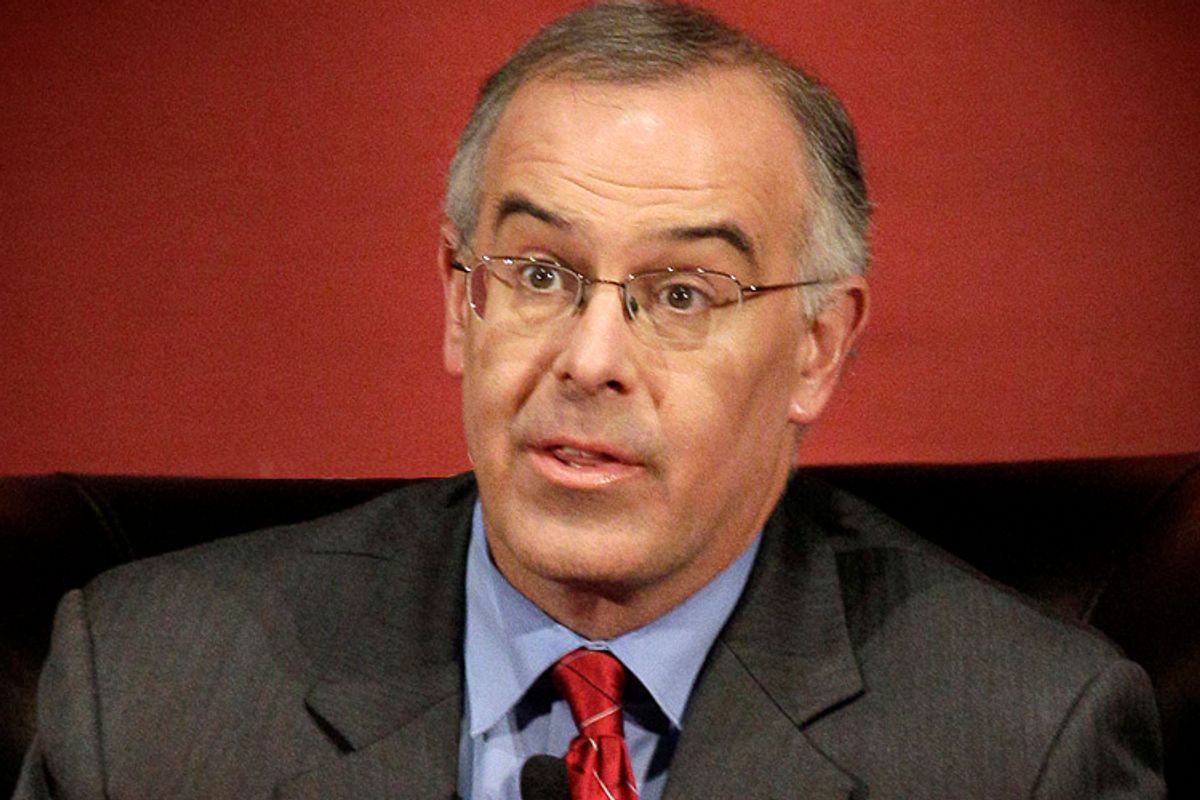David Brooks may not be as influential or widely read as he once was, but give him this much: When it comes to cloaking a dogged promotion of the interests of the Republican one percent as high-minded, above-the-fray pontification, he still can't be beat. Consider his latest New York Times column, a misleading disquisition on how "we should all relax about campaign spending" and stop worrying about the effects of Citizens United, as just the latest case in point.
In brief, Brooks's argument is that the data we have so far indicate that 2010's Citizens United decision has not only not destroyed the Democratic Party, as Brooks claims one lawmaker theatrically predicted, but has in fact benefited Democrats the most. Citing the always reliable and forthright Karl Rove, Brooks reports that "Democratic candidates have reserved $109 million in television advertising time before Election Day, while Republicans have reserved $85 million." According to the nonpartisan Center for Public Integrity, Brooks notes, Democratic groups in the 2012 election quite likely outspent their Republican foes.
As Brooks himself acknowledges later in the piece, the Democrats' current fundraising advantage is likely temporary and much of the money being spent on behalf of the GOP is through 501(c)(4) groups that are allowed to keep their donors secret. He treats those revelations as if they were important, but not major. He doesn't do this because he is stupid; he's not. He does this because his column isn't really about Citizens United or the role of money in U.S. politics. It's something much grubbier than that. It is, indirectly, a defense of the Kochs.
If you're familiar with Brooks's politics (authority is always good), you probably suspected as much going in, but Brooks gives the game away in his closing paragraph with a silly and cheap shot at billionaire hedge funder Tom Steyer, an environmentalist who's gone all-in for Democrats this cycle. Steyer's reasoning, as he's previously explained, is that catastrophic climate change is a real possibility, one that Democrats — but not Republicans — are willing to confront. So in the interest of, in his mind, quite literally saving the planet, Steyer is doling out funds.
According to Brooks, this is "really stupid":
The upshot is that we should all relax about campaign spending. We should worry more about America’s rich. Some people who are really smart at making money are apparently really stupid at spending it. This year, the big spender is a hedge fund manager named Tom Steyer. He could have spent $42.7 million paying for kids to go to college. Instead he has spent that much money this year further enriching the people who own TV stations. What a waste.
Those who aren't tuned in to the debate over political spending and the role it plays in our lurch to plutocracy would be forgiven for thinking Brooks's closing dig is petty and uncharitable, but failing to see what it has to do with the Kochs. But anyone who follows these issues could see, right away, what Brooks was doing. That's because Steyer is a favorite target of the right and the go-to example for conservatives trying to argue that there's nothing special or unique about the Kochs' relationship with the GOP. It's a technique journalists who need to maintain their "both sides" credibility use as well. Yet whether the argument is from the GOP, Politico or Brooks, it's still profoundly mistaken, because it always rests on a false-equivalency cornerstone.
Sure, the Koch brothers may spend hundreds of millions of dollars in order to promote policies that will lead to ever more money in their pockets, Brooks implies, but look at that dastardly Steyer and his big donations, too! They're all so silly; a pox on all of their many, many houses! What is conspicuously absent, of course, is that spending money to, in your eyes, save the world is considerably different from spending money to repeal Obamacare. Put another way, Brooks's argument is like saying there's no difference between a serial killer and a soldier so long as they both use guns.
Now, in the interest of giving the Kochs their due credit, it's true that just as fervently as Steyer believes climate change could bring ruin, the Koch brothers believe Obamacare will destroy the United States. Considering that the former is basing his conclusions on empirical evidence and the overwhelming majority of global scientific opinion, while the latter glean their insight from John Birch Society pamphlets and the fanfic of Ayn Rand, the idea that these are both equally valid reasons is absurd on its face. But by sidestepping that issue and withholding from readers Steyer's goals and motivations, Brooks not only obscures the significance of the Kochs' spending, but also deflects attention from the vulgarity and extremism of their views.
All political spending is equal, Brooks would have us believe. Unfortunately for the country, the truth is anything but.

Shares